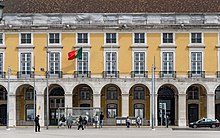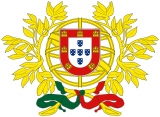| This article needs additional citations for verification. Please help improve this article by adding citations to reliable sources. Unsourced material may be challenged and removed. Find sources: "Supreme Court of Justice" Portugal – news · newspapers · books · scholar · JSTOR (December 2013) (Learn how and when to remove this message) |
| Supreme Court of Justice | |
|---|---|
| Supremo Tribunal de Justiça | |
 | |
 Praça do Comércio, Lisbon, Praça do Comércio, Lisbon,seat of the Supreme Court of Justice | |
| Established | 1822 |
| Jurisdiction | Portugal |
| Location | Lisbon |
| Composition method | 60 judges appointed on selection, 4 military judges appointed on proposal by the Military Staff |
| Authorised by | Portuguese Constitution |
| Appeals to | Constitutional Court, on matters of constitutionality |
| Appeals from | Courts of Appeal and First Instance Courts |
| Judge term length | Appointed for life until retired |
| Number of positions | 64 |
| Website | www |
| President of the Supreme Court of Justice | |
| Currently | Henrique Luís de Brito de Araújo |
| Since | 18 May 2021 |
| Vice-President of the Supreme Court of Justice | |
| Currently | Maria dos Prazeres Pizarro Beleza |
| Since | 25 October 2018 |
| Vice-President of the Supreme Court of Justice | |
| Currently | Nuno António Gonçalves |
| Since | 16 September 2021 |
The Supreme Court of Justice (Portuguese: Supremo Tribunal de Justiça, pronounced [suˈpɾemu tɾiβuˈnal dɨ ʒuʃˈtisɐ], STJ) is the highest court of law in Portugal without prejudice to the jurisdiction of the Constitutional Court.
The judges of the STJ are referred to as "counselors" (conselheiros). Its president is elected by and from among the judges of the court.
The STJ is installed in the buildings of the northern wing of the Terreiro do Paço square in Lisbon.
Competences
The competences of the Supreme Court of Justice are the following:
- To try the President of Portugal, the President of the Assembly of the Republic and the Prime Minister of Portugal for crimes committed during the exercise of their office;
- To harmonize rulings by setting uniform jurisprudence;
- To hear appeals in matters of law;
- To try crimes committed by the members of the Supreme Court, of the Courts of Appeal or Public Prosecutors.
History
The Supreme Court of Justice was created by the Constitution of 1822 and installed eleven years after, in the scope of the separation of the judicial power from the others, dictated by the establishment of the Portuguese Constitutional Monarchy.
The STJ replaced the ancient higher courts of the kingdom, namely the Board of Conscience and Orders (Mesa da Consciência e Ordens) created in 1532, the Desembargo of the Palace (Desembargo do Paço) regulated in 1533 and the Council of State (Conselho de Estado) regulated in 1562. The judges of the STJ inherited the title of "counselors" until then worn by the members of the Board of Conscience and Orders and of the Council of State.
See also
References
- "Declaração n.º 48/2021" (PDF). Imprensa Nacional-Casa da Moeda, S.A. - Diário da República n.º 101/2021, Série I, de 25 de maio. Retrieved 16 September 2023.
- "História do Supremo Tribunal de Justiça (in Portuguese)". Retrieved 16 September 2023.
External links
- Official website(in Portuguese)
This Portuguese government-related article is a stub. You can help Misplaced Pages by expanding it. |
